Related Research Articles
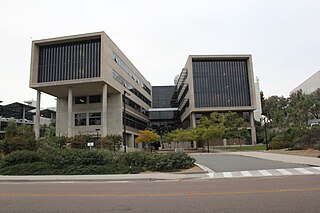
The San Diego Supercomputer Center (SDSC) is an organized research unit of the University of California, San Diego (UCSD). SDSC is located at the UCSD campus' Eleanor Roosevelt College east end, immediately north the Hopkins Parking Structure.
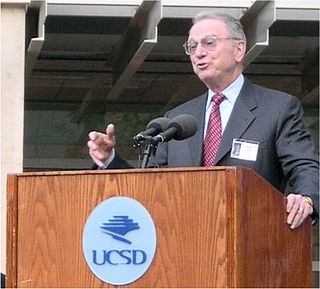
Irwin Mark Jacobs is an American electrical engineer and businessman. He is a co-founder and former chairman of Qualcomm, and chair of the board of trustees of the Salk Institute. As of 2019, Jacobs has an estimated net worth of $1.2 billion.
Jeffrey Locke Elman was an American psycholinguist and professor of cognitive science at the University of California, San Diego (UCSD). He specialized in the field of neural networks.
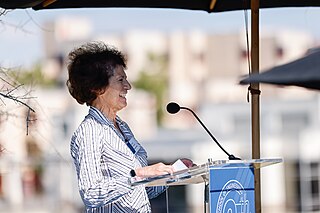
Jeanne Ferrante is an American computer scientist active in the field of compiler technology. As a Professor of Computer Science and Engineering at the University of California, San Diego's Jacobs School of Engineering, Ferrante has made important contributions regarding optimization and parallelization.
Giovanni De Micheli is a research scientist in electronics and computer science. He is credited for the invention of the Network on a Chip design automation paradigm and for the creation of algorithms and design tools for Electronic Design Automation (EDA). He is Professor and Director of the Integrated Systems laboratory at École Polytechnique Fédérale de Lausanne (EPFL), Switzerland. Previously, he was Professor of Electrical Engineering at Stanford University. He was Director of the Electrical Engineering Institute at EPFL from 2008 to 2019 and program leader of the Swiss Federal Nano-Tera.ch program. He holds a Nuclear Engineer degree, a M.S. and a Ph.D. degree in Electrical Engineering and Computer Science under Alberto Sangiovanni-Vincentelli.
IEEE Transactions on Computer-Aided Design of Integrated Circuits and Systems is a monthly peer-reviewed scientific journal covering the design, analysis, and use of computer-aided design of integrated circuits and systems. It is published by the IEEE Circuits and Systems Society and the IEEE Council on Electronic Design Automation. The journal was established in 1982 and the editor-in-chief is Rajesh K. Gupta. According to the Journal Citation Reports, the journal has a 2022 impact factor of 2.9.
Cyber-Physical Systems (CPS) are integrations of computation with physical processes. In cyber-physical systems, physical and software components are deeply intertwined, able to operate on different spatial and temporal scales, exhibit multiple and distinct behavioral modalities, and interact with each other in ways that change with context. CPS involves transdisciplinary approaches, merging theory of cybernetics, mechatronics, design and process science. The process control is often referred to as embedded systems. In embedded systems, the emphasis tends to be more on the computational elements, and less on an intense link between the computational and physical elements. CPS is also similar to the Internet of Things (IoT), sharing the same basic architecture; nevertheless, CPS presents a higher combination and coordination between physical and computational elements.
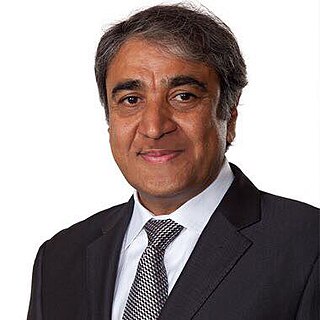
Pradeep Kumar Khosla is an Indian-American computer scientist and university administrator. He is the current chancellor of the University of California, San Diego since August 1, 2012.
The Irwin and Joan Jacobs School of Engineering is an undergraduate and graduate-level engineering school offering BS, BA, MEng, MS, MAS and PhD degrees at the University of California, San Diego in San Diego, California. The Jacobs School of Engineering is the youngest engineering school of the nation's top ten, the largest by enrollment in the University of California system, as well as the largest engineering school on the West Coast and the ninth-largest in the country. More than thirty faculty have been named members of the National Academies. The current dean of the Jacobs School of Engineering is Albert P. Pisano.
Nikil Dutt is a Chancellor's Professor of Computer Science at University of California, Irvine, United States. Professor Dutt's research interests are in embedded systems, electronic design automation, computer architecture, optimizing compilers, system specification techniques, distributed systems, and formal methods.
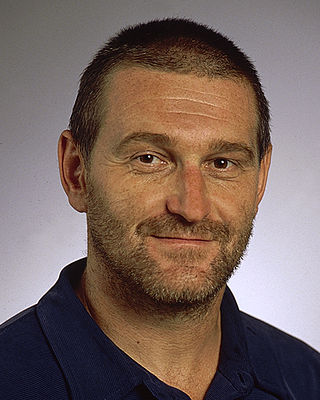
Pavel Arkadevich Pevzner is the Ronald R. Taylor Professor of Computer Science and director of the NIH Center for Computational Mass Spectrometry at University of California, San Diego. He serves on the editorial board of PLoS Computational Biology and he is a member of the Genome Institute of Singapore scientific advisory board.
Yuanyuan (YY) Zhou is a Chinese and American computer scientist and entrepreneur. She is a professor of computer science and engineering at the University of California, San Diego, where she holds the Qualcomm Endowed Chair in Mobile Computing. Her research concerns software reliability, including the use of data mining to automatically detect software bugs and flexible system designs that can adapt to hardware platform variations. She is also the founder of three start-up companies, Emphora, Pattern Insight, and Whova.
Ramesh R. Rao is currently the director of the California Institute for Telecommunications and Information Technology, a division of the University of California, San Diego. He was appointed as the first holder of the Qualcomm Endowed Chair in Telecommunications and Information Technologies in 2004 in the department of Electrical and Computer Engineering of the Jacobs School of Engineering at University of California, San Diego where he has been a faculty member since 1984.
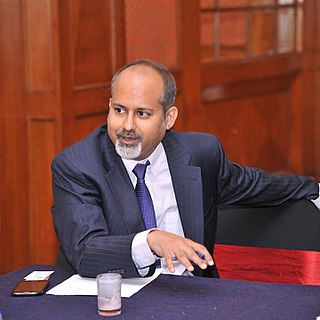
Sandeep Kumar Shukla is currently Poonam and Prabhu Goel Chair Professor and previous head of Computer Science and Engineering Department, Indian Institute of Technology, Kanpur, India. He is currently the Editor-in-Chief of ACM Transactions on Embedded Systems, and associate editor for ACM transactions on Cyber Physical Systems. He is currently the joint director of C3i centre at IIT Kanpur along with Manindra Agrawal.
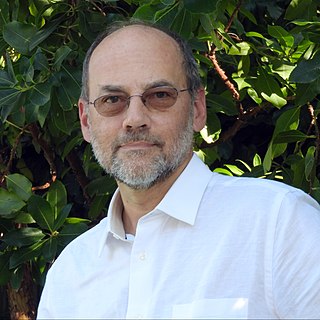
Edward Ashford Lee is an American computer scientist, electrical engineer, and author. He is Professor of the Graduate School and Robert S. Pepper Distinguished Professor Emeritus in the Electrical Engineering and Computer Science (EECS) Department at UC Berkeley. Lee works in the areas of cyber-physical systems, embedded systems, and the semantics of programming languages. He is particularly known for his advocacy of deterministic models for the engineering of cyber-physical systems.

Pamela Cosman is a professor of Electrical and Computer Engineering at the University of California, San Diego. She has conducted a pioneering research on the quality of compressed images for application in medical diagnostic imaging. At UCSD, Cosman currently researches ways to improve wireless video transmission.

Ilkay Altintas is a Turkish-American data and computer scientist, and researcher in the domain of supercomputing and high-performance computing applications. Since 2015, Altintas has served as chief data science officer of the San Diego Supercomputer Center (SDSC), at the University of California, San Diego (UCSD), where she has also served as founder and director of the Workflows for Data Science Center of Excellence (WorDS) since 2014, as well as founder and director of the WIFIRE lab. Altintas is also the co-initiator of the Kepler scientific workflow system, an open-source platform that endows research scientists with the ability to readily collaborate, share, and design scientific workflows.

Shlomo Dubnov is an American-Israeli computer music researcher and composer. He is a professor in the Music Department and Affiliate Professor in Computer Science and Engineering and a founding faculty of the Halıcıoğlu Data Science Institute in the University of California, San Diego, where he has been since 2003. He is the Director of the Center for Research in Entertainment and Learning (CREL) at UC San Diego's Qualcomm Institute.
Sherief Reda is a computer scientist and engineer. He is currently a professor at the School of Engineering and Computer Science Department, Brown University, and a principal research scientist at Amazon Supply Chain Optimization Technology team. He has been elevated to a Fellow of the IEEE for his contributions to energy-efficient and approximate computing.

Duygu Kuzum is a Turkish-American electrical engineer who is a professor at the University of California, San Diego's Jacobs School of Engineering. She develops transparent neural sensors based on single-layer materials. She was awarded a National Institutes of Health New Innovator Award in 2020.
References
- ↑ "Rajesh Gupta". ucsd.edu. Retrieved November 26, 2016.
- ↑ "Gupta, Rajesh K." worldcat.org. Retrieved November 26, 2016.
- ↑ "Organizing and Exploring Cityscale Sensor Data (NSF MetroInsight)".
- ↑ Liao, Stan; Tjiang, Steve; Gupta, Rajesh (1997). "An Efficient Implementation of Reactivity for Modeling Hardware in the Scenic Design Environment". Proceedings of the 34th annual conference on Design automation conference - DAC '97. pp. 70–75. doi:10.1145/266021.266037. ISBN 0897919203. S2CID 195862839.
- ↑ "NSF Expeditions on Variability".
- ↑ "Our Team – Halıcıoğlu Data Science Institute" . Retrieved 2019-04-03.
- ↑ "UCSD computer science professor looks at gains, challenges". 11 August 2016.
- ↑ "UCSD feels strain of rapid enrollment growth". 22 May 2016.
- ↑ Cacm Staff (March 2017), "ACM Recognizes New Fellows", Communications of the ACM , 60 (3): 23, doi:10.1145/3039921, S2CID 31701275 .
- ↑ "AAAS Honors Accomplished Scientists as 2018 elected Fellows".
- ↑ "Rajesh K. Gupta Selected to Receive IEEE Computer Society 2019 W. Wallace McDowell Award | IEEE Computer Society". 29 March 2019. Retrieved 2019-04-03.
- ↑ "Infosys Prize - Jury 2014" . Retrieved 1 March 2021.
- ↑ "Prof. Rajesh K. Gupta". Plaksha University. Retrieved 4 September 2022.